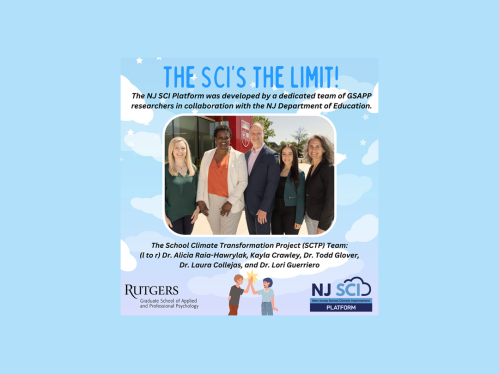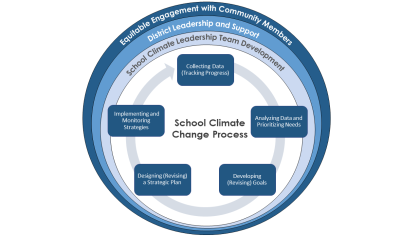
The School Climate Transformation Project
About SCTP
The School Climate Transformation Project (SCTP), a partnership between the Rutgers Graduate School of Applied and Professional Psychology and the New Jersey Department of Education*, supports public K-12 school districts in New Jersey in implementing a data-driven change process to promote systems-level change and inclusive and positive school climates. The SCTP developed the New Jersey School Climate Improvement (NJ SCI) Survey, which is administered through an online platform (NJ SCI Platform). The NJ SCI Platform features online data collection tools and strategic planning resources which help school leaders use data to set school climate goals, implement research-based strategies, and monitor progress over time. NJ SCI Platform districts also have access to professional development opportunities, technical assistance, and direct consultation.
The NJ SCI Platform is currently used by a growing network of over 150 districts and 500 schools throughout the state, and the NJ SCI Survey is currently available in 32 languages for students and families. Public school districts in the state of New Jersey can express interest in accessing these no-cost resources by completing an interest form at njschoolclimate.org.
* Sponsored by the New Jersey Department of Education, Division of Educational Services, in collaboration with the Graduate School of Applied and Professional Psychology at Rutgers, The State University of New Jersey; funded by IDEA, Part B.

What is School Climate?
School climate encompasses the dynamic and diverse feelings, perceptions, and impressions of school community members – in other words, the quality or experience of how it feels to be a part of the school community from one’s unique identity and perspective, as well as in interaction with other members of the community. Perceptions of school climate can change over time and are shaped by factors at various levels. The NJ SCI Survey measures several conditions for learning, or school climate domains, from the point of view of students, staff, and parents and caregivers.
Research consistently shows that positive school climates promote higher levels of student academic achievement and foster the physical, psychological, and social and emotional well-being of both students and staff. Promoting the overall well-being of all staff and students creates conditions for effective teaching and learning that lead to more positive student academic and developmental outcomes. *
*Bohanon, Flannery, Malloy & Fenning, 2009; Brand, Felner, Seitsinger, Burns & Bolton, 2007; Cohen, McCabe, Michelli & Pickeral, 2009; Hosford & O’Sullivan, 2016; Kutsyuruba, Klinger, & Hussain, 2015; Thapa, Cohen, Guffy, & Higgins-D’Alessandro, 2013; Wang & Degol, 2015.

Growing Network
The New Jersey School Climate Improvement (NJ SCI) Platform is free and available for use in all public PK-12 school districts in New Jersey once authorized by the district’s Superintendent or Chief School Administrator.
Schools Using
Districts Using
School Climate Change Process
The School Climate Change Process (SCCP) is based on a behavioral consultation model designed to promote changes in systems and behaviors. The SCCP is part of a theory of change that involves a range of critical steps for success and conditions that support the development and implementation of a comprehensive school climate improvement plan.

Schools begin the SCCP by forming a high-functioning school climate leadership team (SCLT) comprised of diverse school community members that drives and monitors improvement efforts. Teams collaborate to collect and analyze school climate data from students (grades 3-12), staff, and parents/caregivers and use these and other data to drive goal development and alignment of strategies to goals to build a comprehensive and coordinated strategic plan. Development of this comprehensive strategic plan requires ongoing communication and collaboration with school community members. This helps to ensure equitable access to data and feedback throughout the change process and is essential for achieving goals.
Once schools begin to implement their plans, they evaluate progress and make necessary modifications based on new data and information collected. Schools continuously cycle through this process, collecting data and evaluating progress over the course of several years. Research suggests systemic, positive changes related to school climate improvement typically take three to five years*.
Leadership support and coordination at the district level is vital to starting and sustaining the SCCP. District leaders champion the importance of this work in the community and enact leadership skills and competencies to drive the SCCP, including aligning a district’s vision and values to school climate goals and priorities, engaging various key community members, and providing structures and supports to enable individuals and teams to effectively and efficiently facilitate school climate improvement activities. Equity, particularly as it relates to communicating and engaging with school community members, is prioritized throughout each element of the SCCP and is attended to by both district–and school-level leaders.
*Cawelti, 1999; Protheroe, 2011.
School Supports and Services
School Climate Improvement Resources
The project provides School-and District-Climate Leadership teams with the necessary tools and resources to be successful at each stage in the School Climate Change Process (SCCP). SCTP staff support school personnel in using a free web-based application for school climate improvement.
The New Jersey School Climate Improvement (NJ SCI) Survey is a comprehensive instrument designed to help schools identify school climate strengths and needs, and use these data to create strategic plans to improve conditions for teaching and learning. The NJ SCI Survey is administered via the NJ SCI Platform to students in grades 3-5, students in grades 6-12, all school staff, and parents/caregivers with children in all grade levels. The survey and associated communication tools are available in multiple languages for students and parents and caregivers.
The New Jersey School Climate Improvement (NJ SCI) Platform is an online application designed to increase district and school access to tools and resources for data-driven school climate improvement planning and implementation. NJ SCI reporting features allow users to disaggregate data by various groups (i.e., grade, gender, race/ethnicity), easily compare similar domains and items across respondent groups, view automated insights and recommendations about the data, and bookmark indicators for discussion and intervention. Additional features to support strategic planning and implementation efforts will be launched as they become available.
Visit njschoolclimate.org for more information on the NJ SCI Survey and Platform and how to get your district involved.
Self-directed Modules and Learning Network Events
Asynchronous, self-directed learning modules are available through the NJ SCI Platform to support teams as they implement stages of the School Climate Change Process (SCCP) in their schools and districts. SCTP staff also provide learning and networking opportunities around targeted needs related to the SCCP. NJ SCI Learning Network events offer district and school platform users the opportunity to connect around best practices in the field of school climate and center on topics such as teaming, data analysis and needs prioritization, strategic planning, strategy implementation, and progress monitoring.
Consultation and Technical Assistance
SCTP staff provide on-demand technical assistance to schools and districts on the platform (via email or virtual session) to support use of online features and workspaces. SCTP consultants also offer first-come, first served consultation and coaching to District Climate Coordinators, their district-level leadership teams, as well as school-level leadership teams to help scale data collection, analysis, and strategic planning efforts.


NJ SCI in Action

Contact the SCTP
Please email njscisupport@rutgers.edu with any questions.





